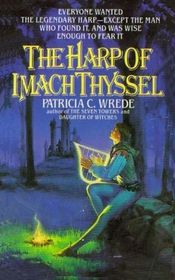Reviewer: Emera
Date read: 2.7.2016
Book from: Personal collection
DID YOU KNOW that before Patricia Wrede hit it out the park with the Enchanted Forest Chronicles, she wrote a fair bit of generic epic fantasy? It’s true! Just look at this:
I found a copy at a used bookstore, and could not pass it up. Those glowing tights exerted an uncanny magnetism.
The Harp of Imach Thyssel is the third in a series of five books set in Lyra, all of which appear to have been recently revised and republished in the omnibus Shadows over Lyra (1997). Here’s the plot of Harp:
“Everyone wanted the legendary harp – except the man who found it, and was wise enough to fear its power.”
Execution was as you might expect based on the cover art. Since it’s Patricia Wrede, the dialogue can be witty, the writing is brisk, and some of the characters’ relationships are mildly intriguing, but otherwise, everything, everything about this book feels almost disturbingly superficial. None of the characters have motivations or desires more specific than “I fear/desire the Harp!” + “I love, in an incredibly nonspecific way, my family and hate my enemies.” There’s little to no sense of either political or mythological reality, even after the barrage of historical exposition in the last 20 pages or so. This is epic-fantasy MadLibs and a triumph of telling-not-showing.
I enjoyed this as a historical curiosity, and derived a bit of scandalous thrill from seeing an author who’s now exclusively acclaimed for mischievous but squeaky-clean YA, write something that involves death and sex (or at least overtly expressed sexual attraction). In the abstract, it’s fun to consider checking out the revised version of this, but given the time… I’d rather reread the Enchanted Forest Chronicles instead.
Go to:
Sorcery and Cecelia, by Patricia C. Wrede and Caroline Stevermer (1988)
The Grand Tour, by Patricia C. Wrede and Caroline Stevermer (2004)
Dealing with Dragons, by Patricia C. Wrede (1990)
Talking to Dragons, by Patricia C. Wrede (1985)
Thirteenth Child, by Patricia C. Wrede (1985)
